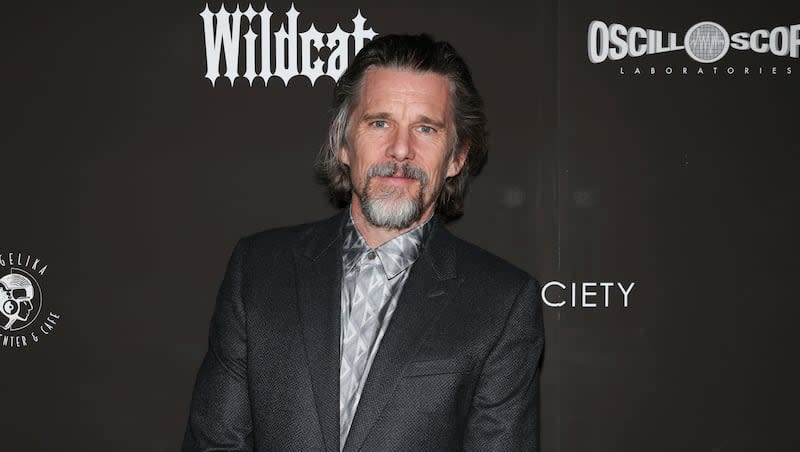What Ethan Hawke said about cinema and faith in a conversation with Russell Moore

- Oops!Something went wrong.Please try again later.
When she was a student at the University of Iowa, Flannery O’Connor wrote in her prayer journal: “Dear God, tonight it is not disappointing because you have given me a story. Don’t let me ever think, dear God, that I was anything but the instrument for Your story.”
O’Connor went on to write two novels and 32 short stories before she died of lupus in 1964 at age 49. But her Catholic faith remained a constant in her life, and the intersection of her faith and imagination is chronicled in a new film called “Wildcat.”
Ethan Hawke, who directed the film and co-wrote the script, talked about the movie last week with Christianity Today editor Russell Moore. Hawke described O’Connor as a “scary writer” who didn’t shy away from showing human beings at their worst.
“She does kind of undress humanity — there isn’t a human being in which she can’t see the way they’re lying to themselves,” Hawke said on Moore’s podcast. “Her stories involve human beings who are really struggling in their daily lives and are offered a moment of grace, or offered an opportunity to heal, and they refuse it, they turn away from it. A lot of her stories deal with that struggle — our lack of humility, is a way of saying it.”
“Wildcat,” which premiered at the Telluride Film Festival last fall, arrived in theaters May 3.
For some directors, it could have been a challenge to bring O’Connor’s simple life to the screen — she once said that no one would write her biography because all she did was write and care for chickens. But Hawke made an hour-and-43-minute film by interspersing scenes from the writer’s life with scenes from some of her often violent stories, stories that many readers have found unsettling, especially given O’Connor’s faith.
Moore noted that few people are on the fence about O’Connor’s work; they either hate her or they love her. And even the writer’s mother says at one point in the film, “I don’t understand why you wouldn’t want to write something that people would like to read.”
Hawke, a four-time Academy Award nominee, acknowledged that O’Connor isn’t for everyone and said that her 1960 novel “The Violent Bear It Away” is “the best book that I would never recommend.”
“She does not make you feel good,” he told Moore. Rather, “she challenges your brain.”
On the podcast, Hawke did not speak openly about his personal religious faith, although he said that playing the role of abolitionist John Brown in the series “The Good Lord Bird” inspired him to think more about “exploring issues of faith in art.”
He added, “I’ve come to view performance in general, the performing arts, as a kind of act of worship, to be honest. I’ve come to see that when my life as an actor is connected to my own inner life that good things happen. When my development as a person is connected to my development as an actor, good things happen.”
While it was clear that the primary relationship in O’Connor’s life was with Jesus of Nazareth, Hawke said, he believes that most people are hesitant to talk about God and faith. If we were to say, at a dinner party, “You want to talk about God?” he said, “the conversation would shut down.”
Hawke’s daughter, Maya Hawke, played O’Connor in “Wildcat,” and the two of them spoke with Bishop Robert Barron of the Diocese of Winona-Rochester about the film and their love of O’Connor’s writing, Fox News reported.
Hawke has previously said that he is an Episcopalian, and that faith used to be more important for him when he was younger, but that he failed to developed his faith in adulthood.
Actor Ethan Hawke, an Episcopalian, on Episcopalians:
"We're wannabe Catholics, we just don't want to do the hard work and we want to be able to get divorced." 🤣
I just wish Catholics understood the difference as well as Hawke does. pic.twitter.com/cUOuurcTTH— Eric Sammons (@EricRSammons) July 20, 2022
Per Fox, he told the bishop, “When I was a young man, I was extremely interested in religion and faith was very, very important to me. And it was everything I thought about and I felt like, ‘How did I get to 50 and never get past first base with my exploration of faith?’ And then the clouds moved away, and I realized that my dedication to the arts had become the manifestation of that faith and that I wasn’t on first base.”
With Moore, he talked about the value of growing up associated with a church.
“I think it hurts us so much as a community when we don’t see ourselves as brothers and sisters on some collective journey, which I think is what organized religion did for me as a child. There was one time every Sunday when you take off your hat and you sit under one roof with a group of people and you say ‘We’re in this together, aren’t we?’ Your status is diminished; we’re all children of God. I found all that so exciting and liberating. Almost like looking at the ocean or looking at the stars.”
“Wildcat” is still in limited release, and the reviews so far are mixed. Writing on the film for Christianity Today, Jessica Hooten Wilson said, “The result is a movie as scandalous as one of O’Connor’s short stories — ‘shocking to the system,’ to borrow her words. Her devotees will applaud it; most of the audience will be left wondering what just clobbered them.”

